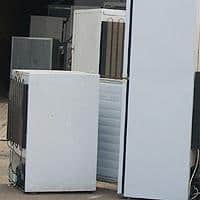Many older fridges are gassed with CFCs – chlorofluorocarbons – which have been implicated in the depletion of the ozone layer and come under the Ozone Depleting Substances Regulations (ODSR). This requires specialist recycling to prevent them being released to atmosphere.
However, newer fridges are more commonly gassed with the hydrocarbons pentane or cyclo-pentane.
But, while hydrocarbons have relatively low global warming potential, cyclo-pentane can contain HFCs, which can damage the ozone layer.
The reprocessors have argued that this type of fridge should still be recycled under the ODSR due to concerns about the potential impact of the HFCs on the environment.
Concerns
Jeff Weeks, technical executive for enviroCom – which has a state-of the-art fridge processing plant that can handle 100 fridges an hour – listed the reprocessors' concerns:
• By allowing fridges containing cyclo-pentane to be shredded in an uncontrolled manner, when there is an existing network of specialist fridge treatment plants that can contain this substance, represents a backward step environmentally.
• Cyclo-pentane is an 11 times more potent greenhouse gas than CO2. If all waste fridges in the UK contained cyclo-pentane (as they will in the next five to 10 years) then they would contain the equivalent of 7400 tonnes of CO2.
• A two-tier fridge recycling system would be created which would be difficult to regulate.
• Any loose fridge doors cannot be identified as to the type of gas they contain and could be inadvertently shredded.
• As many as 50% of the pentane fridges currently being treated at specialist fridge recycling facilities also contain HFCs. This could potentially cause more problems with global warming than CFCs. There are significant environmental risks associated with uncontrolled treatment & disposal of these products.
Speaking at a seminar on WEEE recycling last month, Mr Weeks voiced concerns about a potential threat to the environment if fridges containing pentane were not processed within fridge recycling plants.
He said: “They may not need the same level of treatment as fridges with CFCs but they do contain HFCs and pose risks to the environment. We do not want these escaping through car shredders after someone has degassed them supposedly.”
Simon Hill, commercial manager for Wincanton, added: “In terms of regulations, by allowing a two-tier standard for recycling CFC or non-CFC fridges, treatment plants would have to separate these different waste types. This will be almost impossible to do accurately and even harder to regulate.
“Thus we could see unplanned escapes of CFCs to atmosphere if CFC fridges become inadvertently shredded as a non-CFC fridge. Additionally any loose fridge doors could not be identified as to the type of gas they contain and again could be inadvertently shredded.”
EMR
However, not all reprocessors agree that pentane fridges need to go through specialist recycling, such as European Metals Recycling (EMR). Although the metal recycling firm operates two specialist fridge recycling plants for CFC fridges it does not believe this needs to be done for pentane fridges.
Rob Chaddock, national business development manager at EMR, questioned whether pentane fridges should go through a specialist process. He said: “Specialist recycling of pentane fridges is unnecessarily costly and there is no environmental reason for doing it besides creating a product for compliance schemes and specialist recyclers.”







Subscribe for free